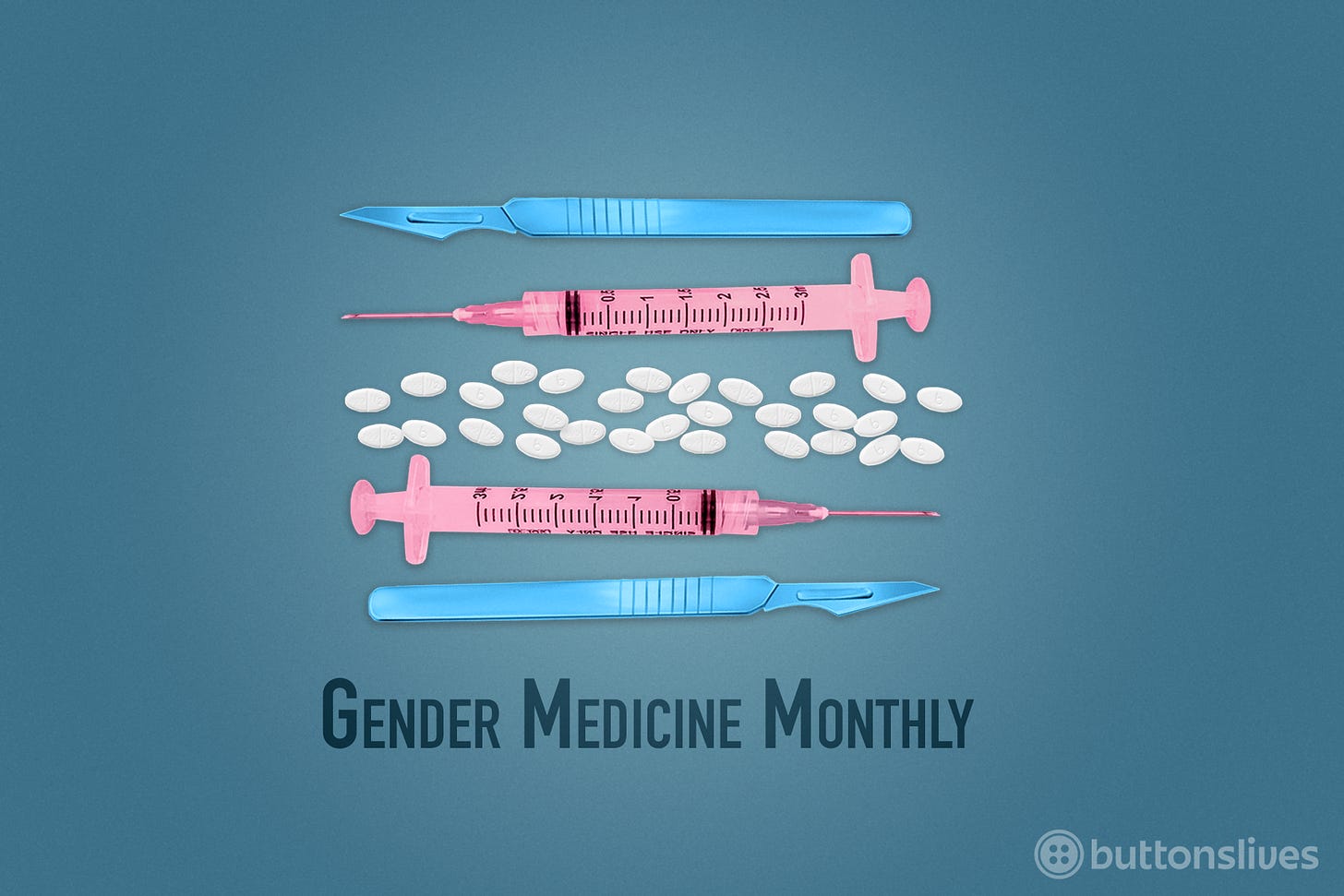Gender Medicine Monthly
May - June 2023
This is the 3rd edition of my new newsletter Gender Medicine Monthly, dedicated to sharing updates related to gender medicine with a particular focus on pediatric gender medicine and the affirmative model of care, for paying subscribers.
March’s inaugural issue is free, as well as a preview of the first part of each issue. If you find the content of this newsletter valuable, please consider becoming a paid subscriber. Your support helps me dedicate my time and energy to producing quality content.
Here are some headlines in gender medicine from the month of May (and the first week of June) covered in this edition of Gender Medicine Monthly.
The UK restricts puberty blockers for children outside of clinical research
Academic publishing giant bullied into retracting new paper on ROGD
New peer-reviewed article reviews clinical and research issues related to detransition
Human Rights Campaign criticized for incentivizing hospitals to promote gender treatments
Texas Democrat defects from party line, issues statement against pediatric medical transition
Researcher debunks pro-affirming paper on state medical transition bans
Dissent arises in Scotland as bioethics chairman publicly criticizes pediatric medical transition
New Zealand government regulator warns public health service of potential illegal use of puberty blockers
Landmark insurance decision raises pressure on Australian doctors to cease pediatric medical transition services
Landmark paper challenges Australian legal frameworks for gender-dysphoric children
1. The UK restricts puberty blockers for children outside of clinical research
Source: NHS England 6/9/23
NHS England has released its final interim specifications for treating gender dysphoric (GD) youth. The primary intervention for individuals under 18 with gender incongruence will be psychosocial and psychological support. The aim is to alleviate distress and promote overall well-being, considering that trans-identification may be a “transient phase” for many young people. Comprehensive assessments, including evaluations for neuro-developmental conditions including autism, will be conducted by multidisciplinary teams.
To address the lack of research in the field, NHS England has established a new national research oversight board. The focus will be on gathering evidence regarding the safety and potential benefits or harms of medical interventions, as well as studying epidemiology, prediction, the course of gender questioning, and outcomes of psychological treatments.
Social gender transition is acknowledged as having potential for harm, but the decision to pursue it will be left to families, with clinicians helping them understand its implications. Specifications for puberty blockers and cross-sex hormones for individuals aged 16+ are yet to be published, but the intention is to limit puberty blockers to those with early-onset gender dysphoria within a Board-approved research study (expected in 2024).
Significance: The newly released service specification will provide guidance for the upcoming gender services that will replace the NHS's Gender Identity Development Service (GIDS). The current service, managed by the Tavistock and Portman Trust, is scheduled to close in March 2024. The interim service specification closely aligns with the draft version that was published in October 2022.
2. Academic publishing giant bullied into retracting new paper on ROGD
Source: Wall Street Journal 6/9/23
Springer, a prominent academic publishing company, has made the decision to retract an article published in the Archives of Sexual Behavior. The article, authored by Dr. Michael Bailey and Suzanna Diaz, discusses rapid onset gender dysphoria (ROGD), which explores the possibility that transgender identities can be socially influenced or a phase. This perspective challenges the prevailing belief that transgender identities are innate and immutable.
Shortly after publication, a group of activists wrote a public letter condemning the article and calling for the removal of the journal's editor. In response, nearly 2,000 researchers and academics signed a counter letter in support of the article. Despite this support, Springer chose to retract the paper without taking action against the editor.
Initially, Springer claimed that the study required approval from an institutional review board but later abandoned this rationale. Instead, they now state that the retraction is due to improper participant consent. Springer argues that while the respondents consented to the publication of the survey's results, they did not specifically agree to publication in a scholarly or peer-reviewed journal.
Significance: The retraction is a result of pressure from activists who disagreed with the article's conclusions. This capitulation raises concerns about academic freedom and the influence of external pressures on scientific research.
The WSJ article highlights a double standard in gender-medicine research. Papers advocating for "gender-affirming care" are readily accepted despite numerous methodological flaws and biases, while research questioning gender-transition orthodoxy faces significant challenges in publication. The goal is to create an appearance of scientific consensus in order to support recommendations for body-altering procedures for children by medical associations.
The retraction of this article by Springer has raised concerns about the potential impact on future research and the stifling of diverse perspectives in scientific discourse.





